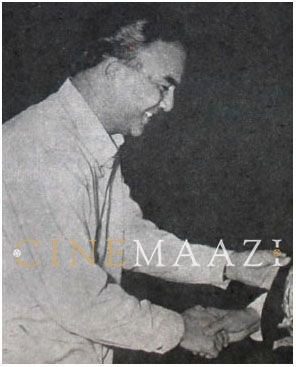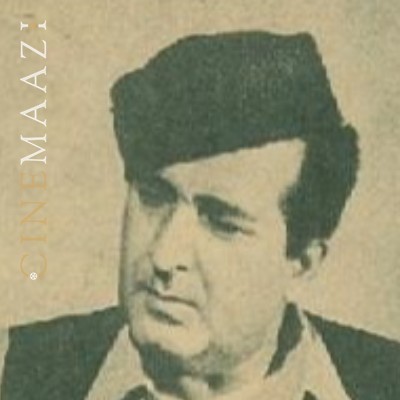B S Thapa

Subscribe to read full article
This section is for paid subscribers only. Our subscription is only $37/- for one full year.
You get unlimited access to all paid section and features on the website with this subscription.
Not ready for a full subscription?
You can access this article for $2 , and have it saved to your account for one year.
- Born: 03 July 1923 (Dehradun)
- Died: 9 August 2016
- Primary Cinema: Hindi
- Spouse: Saroswati Thapa, Pratima
- Children: Arun Thapa, Akhil Thapa, Anil Thapa, Reshma and Simran
B.S. Thapa was born on 3 July 1923 in Dehradun, into a family of Nepali origin. Like most of his family members, he was also expected to join the Army. But his interests diverged from theirs. After completing his secondary school education from D.A.V. Inter-college, he shifted to Lucknow to pursue a Bachelors and Masters degree in Political Science while he simultaneously worked to secure an L.L.B. degree. While studying in Lucknow, he started participating in radio plays, which stoked his latent interest in theatre.
When B.S. Thapa shifted to Delhi with his wife, he began to actively participate in the vibrant theatre scene in the city and performed in various stage plays. During this time, Chetan Anand’s friend noticed his potential and suggested that he try his hand at acting in films. He introduced him to Chetan Anand. The Government of India in those years offered a scholarship to attract talented youth towards cinema. Chetan Anand promised to work with B.S. Thapa on one condition: he would have to earn the scholarship first.
B.S. Thapa secured the scholarship and shifted to Mumbai in 1949 when Chetan Anand was making Afsar (1950) and joined him as an apprentice. He also worked as an actor in some of his films including Anjali (1957), Arpan (1957) and Kinare Kinare (1963). Due to his highly educated background, B.S. Thapa received numerous opportunities in the industry. He was constantly asked for suggestions and particularly sought after for his guidance on movie sets regarding courtroom scenes. The producer-director S.S. Vasan from the Madras based Gemini Studio invited him to guide his writers regarding the same as well. B.S. Thapa also developed a close friendship with Jaidev, the composer for Kinare Kinare, who was at the time composing music for Sunil Dutt’s film Mujhe Jeene Do(1963). Jaidev introduced B.S. Thapa to Sunil Dutt. Dutt was so impressed with Thapa’s knowledge that he asked him to write all the courtroom scenes for his upcoming drama Yeh Rastey Hain Pyar Ke (1963). The two became close friends soon after, and Thapa continued his collaboration with Sunil Dutt as his assistant director in Reshma Aur Shera (1971).
B.S. Thapa made his directorial debut with the film Maitighar (1966), featuring Mala Sinha and C.P. Lohani as the leads. The film also starred Sunil Dutt and Rajendra Nath in guest roles, and Jaidev composed the music for the film. The first Nepali language film made under a private banner, Maitighar turned out to be a platinum jubilee hit. Thapa also directed two Punjabi language movies, Man Jeete Jag Jeet(1973) and Dukh Bhanjan Tera Naam (1974), produced by the composer Mohinder Singh Bedi. B.S. Thapa’s directorial debut in Hindi came with the film Himalay Se Ooncha (1975), produced by Prakash Mehra. B.S. Thapa’s Charandas (1977) also holds a special place in the history of Indian cinema: it is the only film starring Amitabh Bachchan featuring a qawwali picturised on him. The song Dekh lo ishq kamartaba dekh lo was voiced by Yesudas, the only qawwali he sang in his entire career.
In the 1980s, apart from several Hindi feature films, Thapa also directed two Nepali language films, Kanchhi (1984) and Maya Priti (1989). Both the films were silver jubilee hits. B.S. Thapa also continued to garner acclaim for his writing. Two of his stories were adapted into the Telugu films Sudigundalu (1968) and Maro Prapancham (1970).
B.S. Thapa worked with a number of filmmakers over his career and learned a lot in the process. Not just an established filmmaker himself, he was also known for being a good teacher in the film fraternity. He coached various stars including Vinod Khanna, Sanjay Dutt, Karishma Kapoor, Bikram Saluja and Somi Ali at the beginning of their careers to correct their Hindi-Urdu pronunciation and diction. He has also taught in prestigious film institutes like Zee TV’s film school Zee Institute of Media Arts (ZIMA). Though he is no longer active in the film industry, B.S. Thapa’s contribution to Indian cinema remains incomparable.
-
Filmography (5)
SortRole
-

Bal Bramhachari 1996
-

Barkha Bahar 1973
-

Kinare Kinare 1963
-

Hum Dono 1961
-












.jpg)



